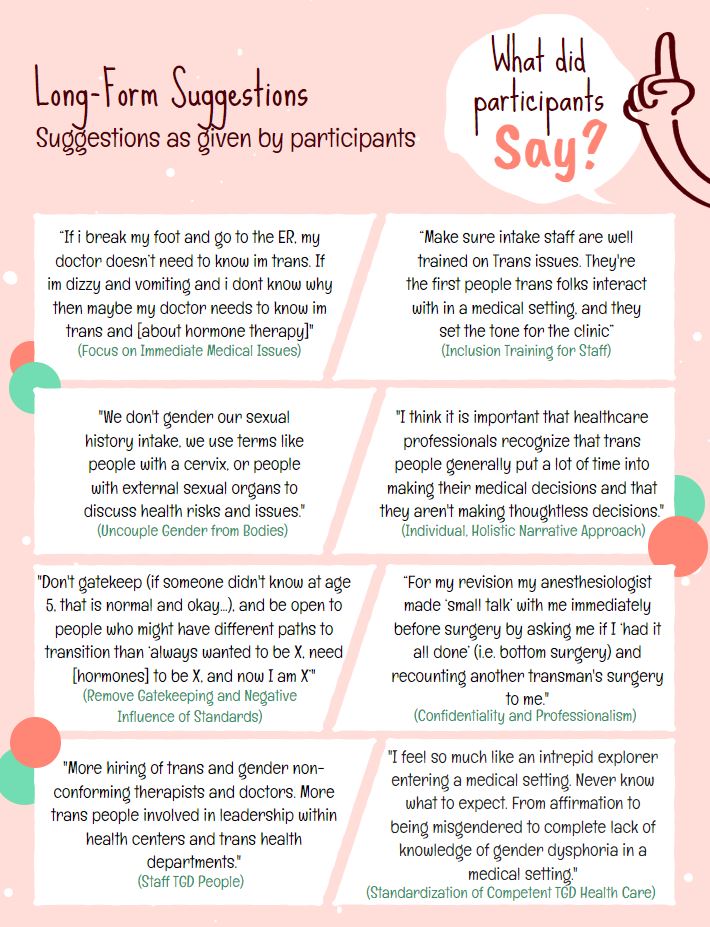Six Recommendations for Reducing Healthcare Barriers for Transgender Patients
March 30, 2023 - Kye Campbell-Fox, Shelly DeJong
Transgender and gender diverse (TGD) people face unique barriers in accessing mental and physical healthcare, such as unknowledgeable providers, minority stress and discrimination, and financial barriers. These barriers are compounded for individuals experiencing multiple types of minority stressors, particularly TGD people of color. These barriers are a major issue for TGD people in accessing healthcare and can result in negative consequences, such as delayed care, not accessing healthcare at all, or fear and anxiety about accessing healthcare.
New research by Dr. Jae Puckett and members of the Trans-ilience Lab surveyed 420 TGD individuals in the United States about what improvements would decrease barriers to accessing healthcare for TGD people. There were six main recommendations for healthcare providers that emerged from this research:
- Eliminate cisnormativity
- Take an individual and holistic approach to care
- Reevaluate standards of care for TGD healthcare
- Reduce accessibility issues
- Improve interactions with patients
- Improve provider and staff training
In addition to these recommendations, there were also several overarching themes, including that it is important to reduce the power imbalance which leaves TGD patients at the mercy of healthcare providers, to listen to TGD people about what they need, and to be proactive in addressing the concerns of TGD people.
 Dr. Jae Puckett is a professor of ecological-community psychology and is a member of the Consortium for Sexual and Gender Minority Health, a thematic research group of the College of Social Science.
Dr. Jae Puckett is a professor of ecological-community psychology and is a member of the Consortium for Sexual and Gender Minority Health, a thematic research group of the College of Social Science.
"Transgender and gender diverse people experience many hardships in accessing affirming and competent healthcare. To change that, providers need to critically evaluate their biases and assumptions, and take stock in how they are living out a commitment to providing competent care. We often see that even individual providers who think of themselves as affirming don’t engage in even the most basic behaviors that would demonstrate being an affirming provider,” said Dr. Puckett. “Through this work, we identified specific strategies that providers can implement to make their practice more affirming for trans and gender diverse patients.”
To eliminate cisnormativity, one must first understand what cisnormativity is. Cisnormativity is assuming everyone’s gender is the same as their sex assigned at birth. Cisnormativity can result in using incorrect pronouns for someone or denying care to TGD patients. Due to the subtle ways that cisnormativity can manifest, a useful first step is for providers to reflect on their own explicit or implicit biases and how these influence their work with TGD patients. To take an individual and holistic approach to care, participants recommended providers recognize nonbinary identities as valid, use gender-neutral language, and employ minimally invasive protocols to minimize dysphoria.

As a part of reevaluating standards of care, participants highlighted the importance of removing gatekeeping and moving on from outdated standards. Previous standards of care required letters of support from mental health providers to access any form of gender-affirming care, but many have questioned whether this is a best practice. This requirement contributes to the financial burden on TGD people who want to access gender-affirming care. Reducing financial burdens, increasing locations and available providers, clearly indicating who are TGD-inclusive providers, providing gender-neutral restrooms, and employing TGD people are all ways providers can increase accessibility for TGD patients.
There are several key factors that participants suggested for improving interactions with TGD patients, including using affirming language, respecting their privacy, focusing on immediate health concerns, and maintaining special regard for TGD minors. Healthcare providers can support youth with difficult family situations and can play a key role in protecting TGD patients’ safety by not outing them. Finally, participants emphasized the importance of improved training for therapists and medical professionals. By making this an education standard for healthcare professionals, TGD patients would be freed from the burden of having to educate their healthcare providers.
“The medical and mental health fields have a long history of marginalizing trans and gender diverse people and disempowering these communities,” said Dr. Puckett. “Counter to this history, these suggestions center the voices of trans and gender diverse people in saying what matters and is important in improving their healthcare experiences.”
To see an infographic of the study results, click here.
To read the full article, click here.

